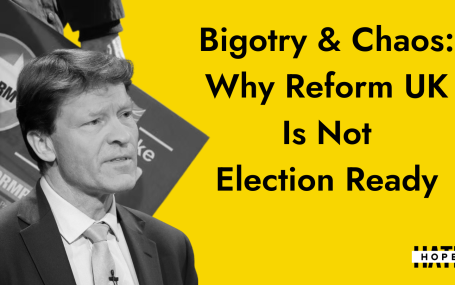HOPE not hate uses cookies to collect information and give you a more personalised experience on our site. You can find more information in our privacy policy. To agree to this, please click accept.
Far-right political parties have played a major role in restricting Muslim women’s religious dress across Europe, but most legislation impacting Muslim women’s clothing has actually been carried out by mainstream politicians.
A new pan-European report published today reveals that nationalist and far-right parties have strongly promoted bans on headscarves and face veils, with many of the proposals initiated by members of these parties.
This has occurred in Austria, Bulgaria, Denmark, Finland, Ireland, Italy, Luxembourg, the Netherlands, Slovakia, Slovenia, Spain, Sweden, the United Kingdom, and to a certain extent in Belgium.
The report, Restrictions on Muslim women’s dress in the 28 EU Member States, funded by the Open Society foundation, was launched today at the European Parliament in conjunction with the European Network Against Racism (ENAR). It comes a year after the European Court of Justice ruled that the ban on headscarves at work can be legal.

Far-right rhetoric has seeped into debates around the headscarf, with bans on religious dress proposed as a way to prevent an ‘Islamic invasion’ of European countries.
The report shows how mainstream parties set legislation in place to restrict religious dress but there are only eight EU states where the restrictions are enforced. Of those, six states have enacted some form of a national ban.
“Most bans on religious dress were instituted after 9/11, in a context of increasing Islamophobia,” the report reveals. “France has been a leader in adopting bans and shaping much of the discourse through its extensive case law and heated public debates, with select other countries, chiefly Belgium, following suit.”
The influx of refugees in Europe and recent terrorist attacks has emboldened those ban supporters who believe that a “clash of civilisations” is inevitable.
The report tabulates the various reasons given for restricting the dress code, from “being perceived as a threat to public security” to the head scarf and face veil being a sign of oppression, which suggests “that Muslim women somehow both lack agency and threaten public safety.
Nearly 1 in 3 #EU countries have restricted #MuslimWomen clothing at local or national level – new report by @OSFJustice highlights need for #inclusiveEurope #NoRestriction4Women https://t.co/bJ7tPQbdnI pic.twitter.com/ubXWo3Be2X
— ENAR Europe (@ENAREurope) April 25, 2018
Muslim women wearing the headscarf against their will has been a persistent argument by proponents of headscarf bans and has also been used in some legal justifications and as basis for bans in several EU states including France.
Another argument made by supporters of the ban, most prominently in Ireland, Finland, the Netherlands, and the Czech Republic is that it prevents integration into Western culture. Other countries such as France justify the ban as promoting ‘living together’ in society.
The researchers make several recommendations for both state and EU level action, such as listening and responding to Muslim women in the debate and rejecting legal restrictions on their clothing.
Other suggestions include outlawing work and education restrictions that “discriminate under cover of neutrality” and collecting and publishing data to reveal discrimination by public and private actors.
HOPE not hate will shortly be publishing a new hub on the activists and ideologues promoting Islamophobia.

HOPE not hate reveals ANOTHER shameful Reform UK candidate – and lifts the lid on the party’s chaotic selection process UPDATE: Reform UK has DROPPED…